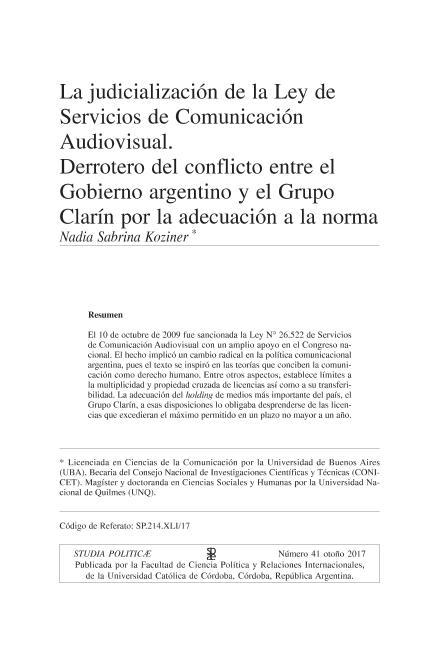Artículo
El 10 de octubre de 2009 fue sancionada la Ley N° 26.522 de Servicios de Comunicación Audiovisual con un amplio apoyo en el Congreso nacional. El hecho implicó un cambio radical en la política comunicacional argentina, pues el texto se inspiró en las teorías que conciben la comunicación como derecho humano. Entre otros aspectos, establece límites a la multiplicidad y propiedad cruzada de licencias así como a su transferibilidad. La adecuación del holding de medios más importante del país, el Grupo Clarín, a esas disposiciones lo obligaba desprenderse de las licencias que excedieran el máximo permitido en un plazo no mayor a un año. Por esa razón, acudió a la Justicia e inició un arduo proceso de judicialización de la Ley. Este involucró a los tres poderes del Estado y se desenvolvió simultáneamente en dos niveles. Por una parte, obtuvo una medida cautelar que lo eximió de iniciar la adecuación a la Ley; esta desembocó en el tramo más álgido del proceso, denominado “7D” en alusión al 7 de diciembre de 2012, fecha señalada por la Corte Suprema de Justicia como límite para la vigencia de la cautelar. Por otro lado, llevó adelante una demanda en la cual reclamó la inconstitucionalidad de los artículos 41, 45, 48 (segundo párrafo) y 161 de la norma. Aunque la judicialización no se agota allí, pues ha cobrado renovadas formas que extendieron su duración hasta la actualidad, en este artículo se examinan los distintos aspectos de ambos frentes de la batalla judicial. Se reseñan las características centrales del proceso, se periodizan los hechos más relevantes y se detallan los fallos de las distintas instancias hasta la sentencia de la Corte Suprema, que cerró el debate por la constitucionalidad de la Ley —aunque no el de las medidas cautelares— en octubre de 2013. On October 10th, 2009 the national Congress passed the Law Nº 26,522 of Audiovisual Communication Services with a broad support. This fact implied a radical change in Argentine communications policy, as the text was inspired by the theories that conceive communication as a human right. Among other things, it establishes limits to multiplicity and crossownership of licenses, as well as their intransferability. The adjustment to these provisions would force the most important media holding in the country, Clarín Group, to sell the large amount of licenses that exceeded the maximum allowed in a period not longer than one year. For that reason, Clarín Group started an arduous process of judicialization of the Law (i.e. a process to declare unconstitutional several articles of the Law and stop their application). This involved the three branches of the national State and developed simultaneously in two levels: On one hand, Clarín obtained an injunction that protected itself from starting the adjustment to the Law. This led to the peak stage of the process, called “7D”, referring to the December 7th, 2012. That was the date set by the National Supreme Court as the deadline for the validity of the injunction. On the other hand, the holding claimed the unconstitutionality of articles 41, 45, 48 (second paragraph) and 161 of the Law. Although the judicialization does not end there, as it has gained new characteristics that extended its length until today, in this article we examine the different aspects of both legal battle fronts, outline the central features of the process, periodize the most relevant facts and describe in detail the sentences from the different stages, up to the decision of the Supreme Court, which closed the debate about the constitutionality of the Law –but not the about the injunctions– in October 2013.
La judicialización de la Ley de Servicios de Comunicación Audiovisual. Derrotero del conflicto entre el Gobierno argentino y el Grupo Clarín por la adecuación a la norma
Fecha de publicación:
10/2017
Editorial:
Universidad Católica de Córdoba. Facultad de Ciencia Política y Relaciones Internacionales
Revista:
Studia Politicae
ISSN:
2408-4182
Idioma:
Español
Tipo de recurso:
Artículo publicado
Clasificación temática:
Resumen
Archivos asociados
Licencia
Identificadores
Colecciones
Articulos(SEDE CENTRAL)
Articulos de SEDE CENTRAL
Articulos de SEDE CENTRAL
Citación
Koziner, Nadia; La judicialización de la Ley de Servicios de Comunicación Audiovisual. Derrotero del conflicto entre el Gobierno argentino y el Grupo Clarín por la adecuación a la norma; Universidad Católica de Córdoba. Facultad de Ciencia Política y Relaciones Internacionales; Studia Politicae; 41; 10-2017; 5-46
Compartir
Altmétricas




